Starting a Vending Machine Business: A Complete Guide for Retirees
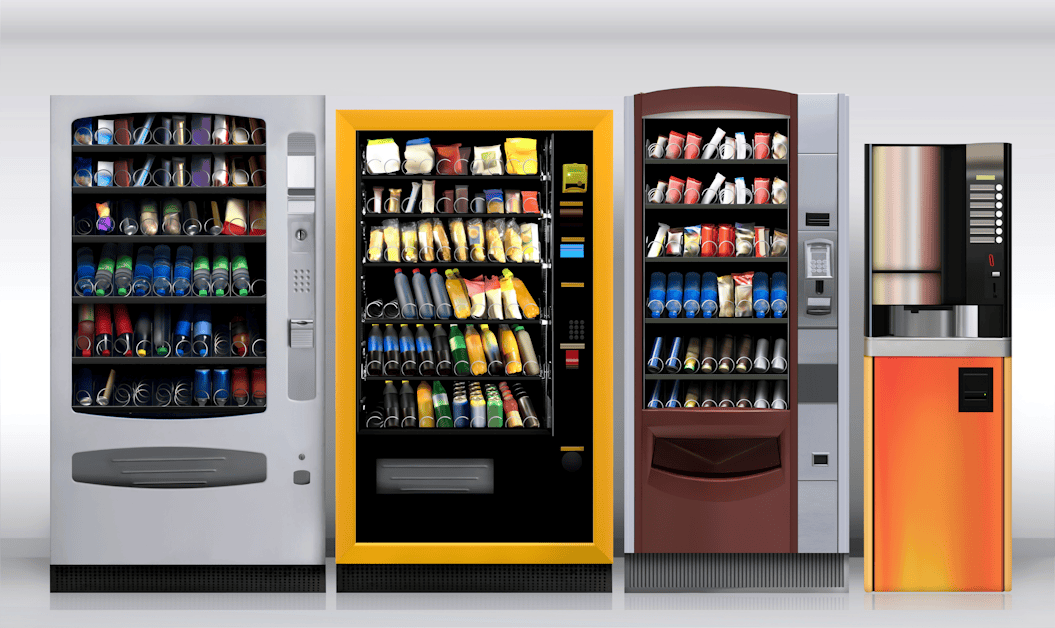
Thinking of starting a vending machine business for extra cash? Vending machine owners have financial responsibilities, operational tasks and profitability to consider. This guide will show you how to start a vending machine business from scratch, including choosing machines, finding locations and managing stock. Get ready to dip into a flexible way to supplement your retirement income.
Quick Facts
Vending machine business is a flexible way to supplement your income and create passive income.
Machine types, locations and product selection is key to sales and profitability.
Technology like remote monitoring and digital payment helps.
Introduction
Getting into the vending machine business allows you to be your own boss and have a passive income stream. For retirees this means an extra income without the commitment of a full time job. The vending machine business is not just about putting machines in and waiting for the money to roll in; it requires planning and good customer service.
Vending machine owners have many responsibilities and considerations, financial like paying rent or commission to property owners based on sales, operational like servicing and restocking machines, and the profitability and tax implications of running a vending machine business.
A successful vending business is about delivering value and good customer service. This is more important now with the healthy vending movement growing and consumer demand for healthy options increasing. Understanding the reasons for starting a vending business before getting into the operational details.
The vending industry in the US is big, 4.6 million machines in operation. These machines generate over $23 billion a year, it’s a great vending machine market to invest in a vending machine company. For retirees this is the perfect combination of flexibility and passive income, you can enjoy your retirement and still have a steady income.
Getting into a vending machine business means being your own boss and having passive income. Whether you want to have purpose, stay active or have financial security having a reason will guide your decisions and keep you on track.
This guide covers everything you need to know to start a vending machine business, industry insights, initial costs, profitable locations and inventory management. Ready to get started?
Why Start a Vending Machine Business?
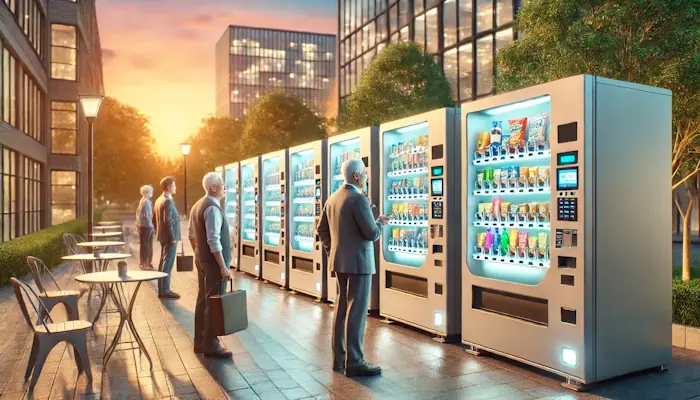
Starting a vending machine business can be a great way for retirees to earn passive income. With the right plan and execution a vending machine business can provide a steady stream of income with low overhead.
Offer a lot of autonomy
One of the biggest advantages of starting a vending machine business is the autonomy it gives you. Vending machines can run on their own, so you can run your business from anywhere. Perfect for retirees who value their time and want to focus on other areas of their life. You can set your own schedule, decide how many machines you want to run and where to locate them.
Get into a growing and in demand industry
The vending machine industry is growing fast, $31 billion by 2027. The growth is driven by the demand for convenience and time saving. By starting a vending machine business you can ride this trend and build a successful business. The industry is always expanding, new opportunities to explore from new machine types to emerging market segments.
Passive income stream
Vending machines can earn money without constant attention. Once you’ve placed and stocked your machines you can collect money and restock as needed. This passive income stream can help you scale your business, invest in new opportunities or just enjoy the financial freedom that comes with it. For retirees this means having an income without the hassle of a traditional job.
Understanding the Vending Machine Industry

The vending machine industry is a goldmine for retirees. It’s passive income through automated retail where the machines do the work and you get the benefits. This is perfect for those who want to supplement their retirement income without the hassle of a traditional job.
There are different types of vending machines to choose from, snack machines, beverage machines, food vending machines and specialty vending machines. Each type serves a different consumer need and can be placed in locations that will maximize sales. For example snack vending machines do well in offices and schools, beverage vending does well in gyms and manufacturing facilities. Specialty vending machines cater to specific products, like coffee or health products.
Profit margins in the vending machine business are high, a well placed machine can give you a good return on investment. A average vending machine can give you a profit margin of 20-30% depending on the products and location. This along with proper management makes vending machines profitable.
Time commitment and management requirements is another important consideration for retirees. Although the business can be hands off, regular maintenance, restocking and monitoring is required to keep things running smoothly. The flexible business model allows you to adjust your involvement according to your schedule and preference.
Understanding the industry of vending machines, such as machine type, profit margins, and time commitments, is critical in making the right decisions to set up your vending machine business plan for success.
Initial Costs and Investments
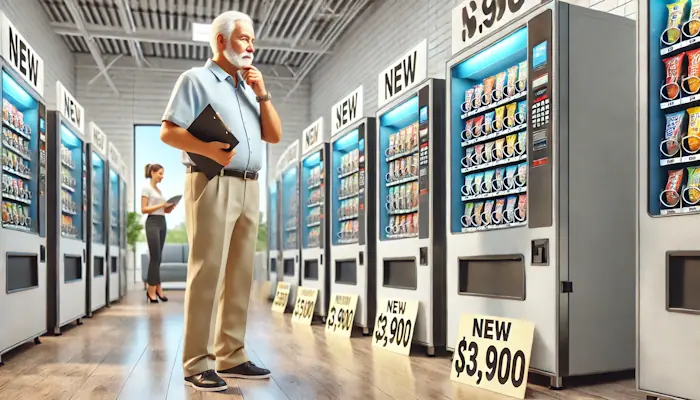
Starting a vending machine business has some initial costs and investments but the returns are worth it. The essential start up costs are purchasing the machines, securing locations and stocking the initial inventory. Vending machine owners need to consider financial obligations of purchasing machines, securing locations and stocking inventory. The cost of a vending machine can range from a few hundred to several thousand dollars for a basic to high capacity machine.
One of the first decisions you need to make is whether to buy new or refurbished. New machines have the latest technology and warranty but are more expensive. Refurbished machines are more affordable and can be just as good if sourced from a reputable supplier. Weigh the pros and cons of each and you’ll make the right choice for your budget and business.
Ongoing expenses are restocking, maintenance and utilities. These costs will vary depending on the products you sell and how often you restock. Make sure to factor these in your business plan so you’re prepared for the long term commitment.
For those who need help with initial investments, equipment financing, business loans and personal savings can cover the start up costs. Most vending machine businesses see a return on investment within 12-24 months depending on the scale and efficiency of the operation.
Plan your initial costs and investments well and you’re set. New or refurbished machines, account for all and finance options.
Financing Your Vending Machine Business
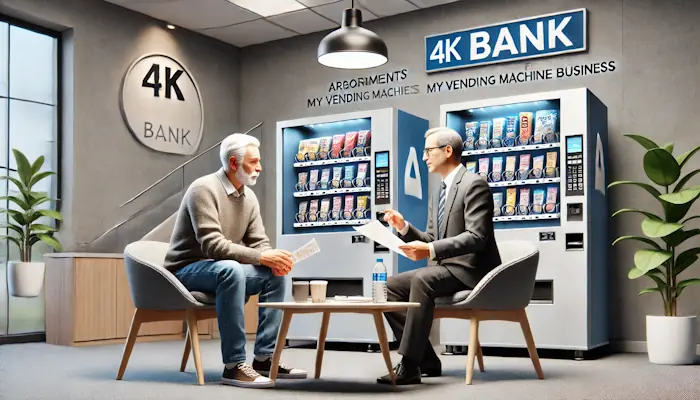
Financing your vending machine business needs to be thought out. Here are some things to consider when financing:
Start up costs
Start up costs for a vending machine business can vary greatly depending on the type and amount of machines you buy. A basic machine can cost between $2,000 to $10,000. You’ll also need to factor in inventory, location fees and other expenses. You need to create a business plan and have financing options to cover these costs.
Some options for financing a vending machine business:
Small Business Loans: These loans will give you the capital to buy machines and cover start up costs. Look for lenders that specialize in small business financing.
Personal Savings: Using personal savings is a easy way to fund your business without debt. Just make sure you have enough in reserve for unexpected expenses.
Crowdfunding: Platforms like Kickstarter or GoFundMe will help you raise money from a large number of people. This works well if you have a unique vending machine concept that will appeal to the public.
Franchise Financing: If you’re buying a vending machine franchise the franchisor may offer financing options.
Equipment Leasing: Leasing vending machines will reduce start up costs and allow you to upgrade to newer machines as you grow.
When looking at financing options consider:
Interest Rates and Repayment Terms: Compare lenders to find the best rates and terms for your situation.
Collateral: Some loans will require collateral, personal assets or business equipment.
Credit Score: Meet the credit score requirements for the financing option you choose.
Funding Amount: How much funding do you need and will the financing option cover your start up costs.
By doing your due diligence and having a business plan you can get the funding you need to start and grow a vending machine business.
Choosing Profitable Locations

A vending machine business is all about finding high traffic areas where customers walk by frequently. That means finding locations that are busy and have a constant flow of foot traffic. High traffic locations mean your machines are seen and used by lots of people, maxing out sales and profits.
Good locations for vending machines are manufacturing facilities, office spaces, hospitals, nursing homes, car dealerships, schools, universities, gyms and retail stores. Each of these locations has its own benefits. For example manufacturing facilities have lots of employees working long shifts, perfect for snack and beverage machines. Office spaces with 50 or more employees can generate big sales as workers need quick snacks.
Vending machine owners need to pick locations to maximize sales and profits.
Getting permission from property owners is required to legally put a vending machine on their property. Negotiating location agreements may involve highlighting the benefits your vending machine will bring to employees or customers. Also consider location security and accessibility so your machines are safe and easy to service.
Location security and accessibility are key to your vending machine business. Having your machines in secure areas will minimize the risk of vandalism or theft. Having accessible locations will make it easier for you to restock and maintain the machines.
Picking the best location for your machines is arguably the most important thing to ensure a healthy vending machine business. Strategic scouting of high-traffic locations and negotiations with property owners get your machines out in strategic positions, thus maximizing sales and profits.
Product Selection and Inventory Management

Choosing the right products for your vending machines is key to sales and customer satisfaction. A mix of popular snacks, drinks and specialty items will attract a wider customer base. Having options means there’s something for everyone and more chance of repeat business.
Vending machine owners must manage product selection and inventory to ensure customer satisfaction and profitability.
Effective pricing strategies maximize profitability. Competitive prices that reflect product quality and demand encourage more purchases. Monitoring sales data and adjusting prices as needed helps remain competitive and profitable.
Dependable inventory tracking and restocking systems keep your machines appropriately stocked and working. An adequate inventory management system helps track merchandise levels, monitors sales, and schedules re-supply efficiently to make sure all popular items are available all the time and do not miss any sales.
Stronger relationships with your suppliers and the benefits of bulk purchasing have an effect on the bottom line. Buying from known, reliable suppliers ensures consistency in quality and availability of merchandise. More often than not, there are discounts associated with a bulk purchase, which decreases the overall cost and raises profitability.
Success for a vending machine business comes back to effective product selection and management of inventory. Offering the strategic mix of products at competitive prices, implementation of an efficient inventory system to ensure maximum sales, and customer satisfaction include but are not limited to some of the ways used in maximizing sales and gaining customer satisfaction.
Legal and Business Requirements
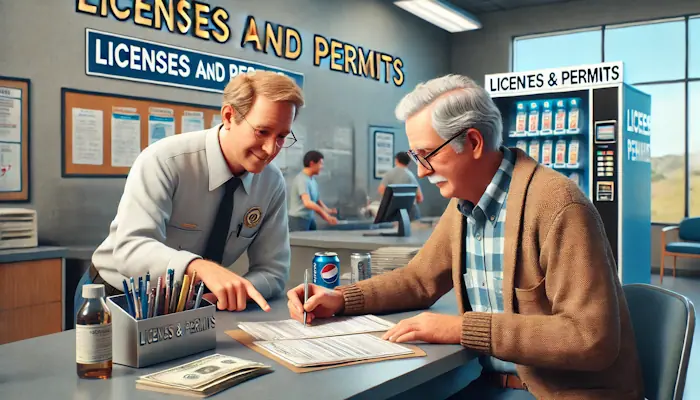
Starting a vending machine business has a lot of legal and business stuff to navigate. First you need to register your business and get the necessary licenses and permits so your business is legal and compliant with local laws. Vending machine owners have to navigate all the legal and business stuff to be successful.
Insurance is also important. Different types of insurance like liability insurance can protect your business from potential risks and liabilities. You need to understand the options and choose the right policies for your business.
Health department regulations are more relevant for food and beverage vending machines. Compliance with these regulations ensures the products you sell meet health and safety standards. This protects your customers and avoids legal and fines.
The most critical matters to address when operating the business of vending machines relate to tax implications and the keeping of records. Your records regarding sales, expenses, and profit will help you monitor your cash and see that your taxes are in order. To make record-keeping much easier, it would be to your advantage to open a specific bank account for the business, separating personal finances from those of the business.
Meeting the legal and business requirements helps in smoothly operating your vending machine business. By following all regulations, taking out necessary insurance, and keeping good records, you will protect your business and set it up for long-term success.
Technology and Modern Vending Solutions
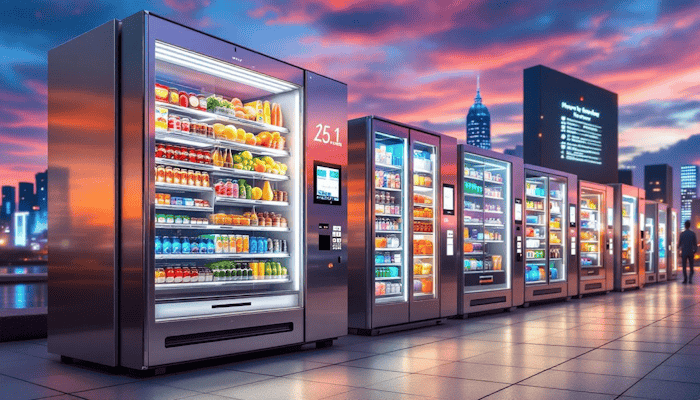
You need to be embracing technology to run a vending business today. Digital payment and contactless options are getting more and more popular, its convenient for customers and boosts sales. Adding these payment methods to your machines will attract more customers who prefer cashless transactions.
Remote monitoring and inventory tracking software are some of the most important tools you will use to manage your machines efficiently. These technologies enable you to monitor product levels, track sales, and schedule restocking from any location, reducing the frequency of on-site visits. This saves not only time but also ensures that your machines are always well-stocked.
Sales data analysis tools give some idea of customer preferences and purchasing patterns. Such analytics allow you to make efficient decisions regarding product selection, pricing, and marketing strategy. By knowing what moves well, you will be able to optimize your inventories for maximum profitability.
Benefits offered by smart vending technologies are many, including a great customer experience and much-improved operation. Some features that will help attract customers include touchscreens, interactive displays, and personalized recommendations that will help increase the rate of return customers. Also, smart vending machines can cut down on maintenance needs through real-time diagnostics and alerts.
The modern solution and technology for vending will multiply the efficiency and profitability of your business. Digital payment systems, remote monitoring, and smart technologies go a long way in helping you stay ahead of the competition and meet evolving market demands.
Maintenance and Operations
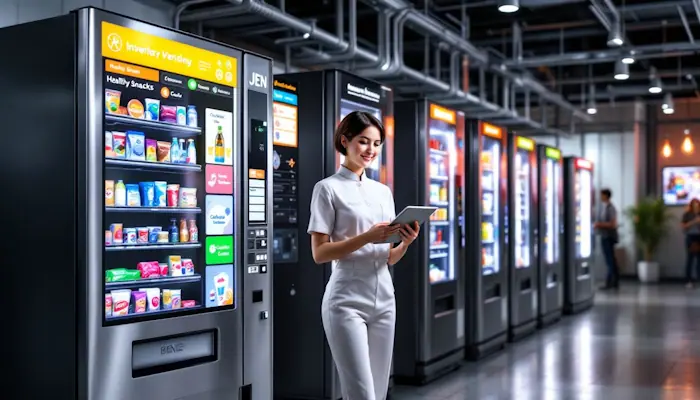
Taking good care of your vending machines is really important if you want to make money and keep them running for years to come. Especially if you are running a refurbished vending machine operation. Trust me, setting up a regular maintenance schedule makes all the difference – it’s just like taking care of your car or your home.
Here’s what you need to do: Keep those machines clean (customers notice!), check that all the parts are working right, and make sure the machine is taking money properly. It’s pretty straightforward once you get into a routine.
When something goes wrong – and it will from time to time – don’t panic. Most problems are pretty simple to fix if you catch them early. It’s like that old saying: “A stitch in time saves nine.” Learning some basic troubleshooting will save you money and headaches down the road.
One of the biggest challenges is keeping your machines stocked. You’ll want to plan your routes carefully – there’s no sense driving back and forth across town! Keep track of which items sell best at each location. After a while, you’ll get a good feel for what your customers want.
Now, here’s something to think about: Should you do everything yourself or hire some help? Doing it yourself saves money, but having help gives you more free time. It really depends on how many machines you have and how busy you want to be. Refurbished vending machines
Bottom line: If you stay on top of maintenance, learn how to fix common problems, and get organized with your restocking, you’ll do just fine in this business. It’s not rocket science – just good old-fashioned attention to detail and regular care.
Scaling Your Vending Machine Business

Scaling your vending machine business will increase your revenue and visibility. As you get more experience add more machines, new locations and new products. Vending machine owners can scale by adding more machines, new locations and new products. This will get you more exposure and more profit. Many successful operators find that careful expansion leads to exponential growth over time.
Buying an existing vending machine business is another way to scale fast. Buying an established business gives you an instant network of machines and locations, no need to source and negotiate new locations. This will save you time and effort and give you a steady income from day one. The previous owner’s expertise can be invaluable in understanding local market dynamics.
Bulk vending machine are machines that sell an unsorted items like nuts, gumballs, toys and novelties. Bulk machines which require minimal maintenance and investment can be a great addition to your own vending machine business. Proper placement of bulk vending machines will give you passive income and contribute to your overall business success. Consider placing these machines in high-traffic areas where families frequently shop.
Using various tools and software will help you monitor your business sales data and make informed decisions to scale. Analyzing sales trends and performance metrics will help you find opportunities to grow and optimize your business for maximum efficiency. Modern inventory tracking systems make it easier than ever to manage multiple machines effectively.
Scaling your vending machine business requires planning and decision making. Adding more machines, new locations and using data analysis tools will grow your business and increase revenue. The key is maintaining quality service while expanding your operation systematically.
Summary
In a nutshell, starting a vending machine business is a great option for retirees. The industry offers passive income and there are many types of vending machines to cater to different customer needs. Knowing the initial costs and investments, choosing profitable locations and managing product and inventory is key.
Legal and business requirements and embracing technology is important for smooth operations and growth. Regular maintenance and efficient operations will keep your machines going and profitable. Scaling your business through strategic expansion and data driven decisions will increase your revenue.
Follow this guide and you’ll be vending like a pro and building a successful business. The flexibility and passive income is perfect for the retirement lifestyle and gives you financial security and purpose. Start your vending machine business today!
Frequently Asked Questions
Q: What are the starting costs for a vending machine business?
A: Starting costs typically range from $1,000-$10,000 per machine, depending on whether you buy new or refurbished. Initial inventory and location fees will add to your startup expenses. Many successful operators start with just one or two machines to learn the business before expanding.
Q: How do I find good locations for my machines?
A: Look for high-traffic areas with lots of foot traffic and limited food options. Office buildings, gyms, schools, and manufacturing facilities are popular choices. Always get written permission from property owners and ensure the area is safe and well-lit.
Q: What products should I stock in my machines?
A: Stock a mix of popular beverages, snacks, and some healthy options. What sells best will depend on your location – offices might want fresh sandwiches while gyms prefer sports drinks. Keep track of your sales and adjust your product mix accordingly.
Q: What are the legal requirements for running a vending machine business?
A: You’ll need to register your business, get appropriate licenses and permits, and carry insurance. Health department permits are required for food and beverage sales. Keep good records for tax purposes and make sure you have proper agreements with property owners.
Q: How can I grow my vending machine business?
A: Start small and master your operations before expanding. Use your sales data to guide decisions about new locations and products. Consider adding bulk vending machines or buying existing routes. Focus on quality locations rather than quantity – a few well-placed machines often outperform many poorly-placed ones.
Disclosure: Some of the links in this article may be affiliate links, which can provide compensation to us at no cost to you if you decide to purchase. This site is not intended to provide financial advice. You can read our affiliate disclosure in our privacy policy.
